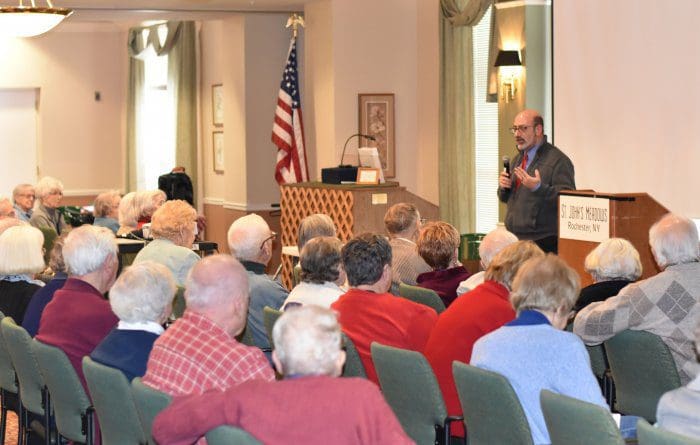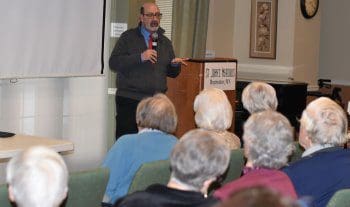Rochester Expert Shines Light on Importance of Advance Directives

“You want to choose somebody who knows your wishes, understands how you make decisions, and also understands your value system.” This advice on choosing a health care agent from Dr. Daniel Mendelson was one of many takeaways from his presentation at St. John’s Meadows on February 7. An audience of over three dozen residents (including Gene Mendelson, his proud father), employees, and guests attended Dr. Mendelson’s discussion, the first session of this year’s “Writing Your Final Chapter” series at St. John’s.
Dr. Mendelson is the William and Sheila Konar Family Professor of Geriatrics, Palliative Medicine, and Person-Centered Care at the University of Rochester and Associate Chief of Medicine at Highland Hospital. He is also an internationally recognized expert in palliative care, a specialized form of medicine focusing on patient comfort. While he did discuss the commonly misunderstood difference between palliative care and hospice, Dr. Mendelson’s focus was on the ways a person can work with a team of loved ones and trusted professionals to make their wishes for end-of-life care known in advance.

Dr. Mendelson began by discussing the intricacies and importance of completing a health care proxy, a step he recommends every adult make a priority. The health care proxy allows you to formally appoint a health care agent. In addition to understanding your wishes for care later in life, he suggests choosing someone who is able to follow through with your wishes if and when you are no longer able to speak for yourself. “You want to choose somebody who can logically separate themselves from these decisions.”
As someone who served on the committee that created the original MOLST form in New York State, Dr. Mendelson is more than qualified to speak about the distinctive pink form that gives a person’s doctor a way of communicating important medical instructions to other health care professionals. He suggests that if you have definitive, specific wishes for your end-of-life care, the MOLST form is the place to express those wishes.
In discussing the difference between the MOLST form and a living will (a form that can be used to give guidance to a representative but is not legally binding in New York State), Dr. Mendelson made it clear that he recommends that most older adults also have a “do not resuscitate” order in place. He cited statistics on the length and quality of life for people who have had cardiopulmonary resuscitation (CPR) or advanced cardiac life support while making his case. As he explained: “most of us value meaningful life with our families and do not wish to suffer.”
Overall, Dr. Mendelson believes that while it may not be the most pleasant exercise, doing your due diligence when filling out advance directives is worth the effort. “It is a way of having control when you ordinarily would not,” he said. “It also takes the fear and angst out of the process. It is actually a gift to your family and friends.”
